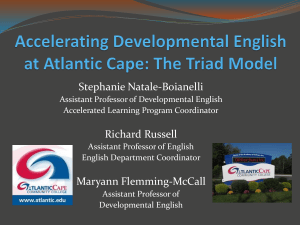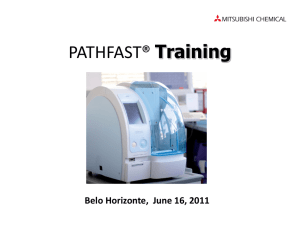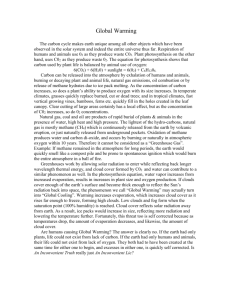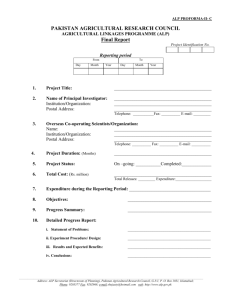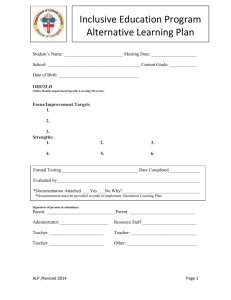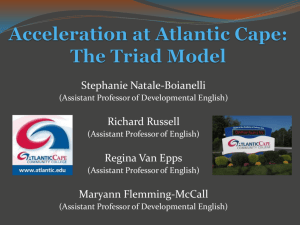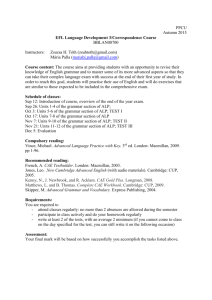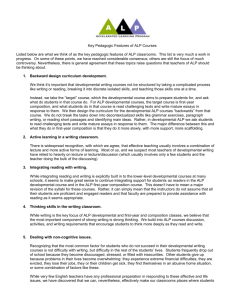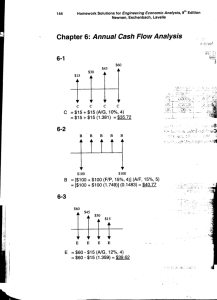A Success Story - Atlantic Cape Community College
advertisement
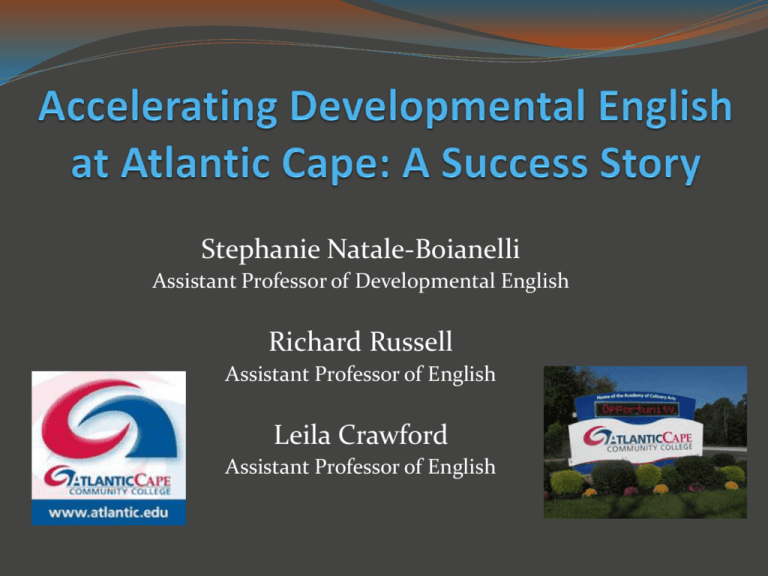
Stephanie Natale-Boianelli Assistant Professor of Developmental English Richard Russell Assistant Professor of English Leila Crawford Assistant Professor of English Traditional ENGL080 Students (AtD Cohort) Gateway Course Success No. of Students 1503 English 101 Completion Rate 45% English 102 Attempt Rate 30% English 102 Completion Rate 26% Students who place into Engl080 by completing Engl070 or the ESL program are not currently eligible for ALP. Community College of Baltimore ALP Model ENG 101 ENG 052 A L P ALP Advantages (Baltimore model) reduces stigma improves attachment provides stronger role model encourages learning communities changes attitude toward developmental course allows individual attention allows time for non-cognitive issues allows coordination of the two courses A L P The Accelerated Learning Program The Triad Model Once a week, ENGL099 meets in a computer lab. ENGL099 & ENGL101 are both three credit courses. ALP 080 Backward design Traditional course The goal is for students to pass the college-level course. The goal is for students to pass the developmental course. Developmental course is taken concurrently with the college-level course. Developmental course is taken as a prerequisite to college-level course . Teacher is expected to both teach and mentor the students. Teaching is the only expectation. Focus on non-cognitive issues No formal focus on non-cognitive issues Two critical ALP features: Both courses are taught by the same professor. Eleven of the students in the collegelevel course placed into credit-level English. ALP Syllabus Student Learning Outcomes/Objectives, similar to ENGL101 syllabus, with important additions: Students will learn the value of being an active participant in a learning community: how to prepare for/attend classes; actively participate; respectfully/responsibly interact with learners; ethically collaborate/study for other classes. Students will choose a program path for the next two years, study the schedule in the tabloid, make effective decisions for scheduling an academic semester. Students will discuss the pros and cons of shortened summer semesters and of online classes. Students will become familiar with the college culture: make use of available and appropriate resources; meet with the instructor to discuss individual program; learn about essential services/procedures for registration and about extracurricular activities; etc. What ALP Students Need Early in the semester: Understanding of ALP (I don’t really know how I ended up here… The advisor recommended I take this class.) Buy-in of the program (Save money! Save time!) Buy-in of the professor (This professor authentically wants me to succeed.) Introduction to ins and outs of their school Faculty must complete one full day of training and work with a mentor during their first semester teaching ALP After a few weeks, they need Check-ins on their other courses and professors (mid-term evaluation form). Additional work on writing skills introduced in Composition class, acknowledging the relevancy of the work: sample annotated readings and annotation practice in class sample essay outline with starter sentences. ALP student leads ALP class in creating works cited page for their essays together complex thesis creation by writing (and answering) probing questions after a reading At end of semester, they need A sense of what’s ahead (introducing Comp IIspecific skills like database-use, evaluation of websites, and argumentation techniques) Guidance in crafting work/school schedules, choosing degree programs, selecting classes Clearer sense of self and capabilities (letters to self through snail-mail or futureme.org) Curriculum Planning First day of each week: discuss questions from previous week in 101 and/or reading/writing concerns from other classes. Instructor consideration: What should be reinforced in both 101 class and in ALP? What should be addressed in only ALP? Design “just in time” exercises/group activities within learning communities. Sometimes student-generated concerns supersede planned activities. Active learning; NOT drill and practice. Personalize/contextualize learning for ALP students. A Sample Week English 101 Day 1––Start The Alchemist. Read “The Prologue.” Discuss the four obstacles Coelho identifies. Discuss vocabulary terms (alchemist; narcissist). Discuss the Myth of Narcissus. Discuss age/characteristics of the protagonist (Santiago). Discuss geographical context for novel. Day 2––Review Paper #1 options. Review MLA style. Lecture/powerpoint and/or discussion and inductive activity. ALP Day 1 In-class writing: “What is your personal legend? How will you achieve it? What obstacles might deter you?” Preview next day’s reading. Day 2 (computer lab) Generate MLA (and APA) citations for three sources (article, movie, novel), using a style guide or online citation generator (Knight Cite). Scaling Up: Timeline Spring 2012 Fall 2012 Spring 2013 4 triads; 3 campuses; 81 students Effie Russell pilots program with 11 students Fall 2013 Spring 2014 6 triads; 108 students 4 triads; 53 students 4 triads; 51 students Fall 2014 Spring 2015 10 triads; 180 students; 4 adjuncts; part-time students eligible 7 triads; 126 students; first evening triad Traditional ENGL080 Students (AtD Cohort) ALP Students Fall 2012 & 2013 No. of Students 1503 172 English 101 Completion Rate 45% 81% English 102 Attempt Rate 30% 62% English 102 Completion Rate 26% 53% Gateway Course Success From “Replicating the Accelerated Learning Program: Preliminary But Promising Findings” study conducted by the Center for Applied Research. You can access a copy of the study here: http://alp-deved.org/2014/02/findings-from-a-nationwide-alpstudy-just-released/ From “Replicating the Accelerated Learning Program: Preliminary But Promising Findings” study conducted by the Center for Applied Research. You can access a copy of the study here: http://alp-deved.org/2014/02/findings-from-a-nationwide-alpstudy-just-released/ From “Replicating the Accelerated Learning Program: Updated Findings” study conducted by the Center for Applied Research. Triad Model Advantages Students Faculty Administration • Merging from two sections of Engl101 allows students to compare academic experiences. • Larger class size fosters class discussion, creates a typical classroom environment, and allows for more diversity among the students. • Merging from two sections of Engl101 allows for authentic discussions of the diversity of the student experience. • Scheduling is easy: two days, three classes in a row; a full load for adjuncts; 9 credits total is 3/5 of a full-time load. • Class size is comparable to the developmental course. Triad Model Challenges Students Faculty Coordinators • Gaps can make the course schedule inconvenient. • Reaching every student individually in a single class session is difficult. • Two Engl101 experiences must be united. • Triads are complicated and difficult to schedule. • Finding and training faculty can be difficult, especially part-time faculty. Discovering Campus with Scavenger Hunts Discovering Campus: Student Handbook Project Step 1. Review/discuss the official student handbook. Step 2. Brainstorm topics that should be in our handbook. Step 3. Research/explore topic in pairs. Step 4. Create the handbook page. Step 5. Presentation/peer review. Step 6. Revision and publication. ALP Wellness Project “The Stressors That Make Students Quit (And How to Defeat Them)” Brainstorming What’s the connection between health and wellbeing, health and success, health and happiness? What are the mental health and well-being issues that afflict college students? What stands in the way of getting help? Wellness Work Goals: to find out about a specific issue that afflicts college students— statistics, warning signs, issues with diagnoses/treatment to locate campus resources and contact people to locate local/nationwide resources and contact people to locate a professional event, video, or source that is educational and supportive to inform others about this issue Wellness Project Create a document, slideshow, pamphlet, poster, or some combination that addresses all five goals above. Address the goals explicitly please. Be prepared for ten minutes for each person’s presentation of information plus ten minutes for Q&A. Note: From Sp ‘15, topics included addiction, single motherhood, time management, anxiety and depression. Self-Assessment: Reflective Writing ICW (Week 1): Besides getting “good grades,” what are your goals for this semester? How will you ensure that you are working towards these goals? Students will revisit these goals and their progress throughout the course. Students write a short reflection/letter to me to submit with Paper #1. ICW (Week 3): Discuss your writing process. What was the most difficult part about writing Paper #1? What are the strengths of your paper? Self-Assessment: End-of-Term Reflection I. What are characteristics of “good writing”? Use specific examples read for class and explain what made them effective. II. What are your strengths as a writer? Use specific examples. III. What are you still working on in your writing? Some variation used for the “final exam” Self-Assessment: End-of-Term Reflection From “Ending at the Start” (David Gooblar), The Chronicle of Higher Education, 29 April 2015: Write a letter to a future student of this class. What do you wish you would have known before taking this class? What should future students know about this class or professor? (Advice.) Thank you! “I always felt like I was one step ahead of all the other kids in English 101 because of the extra work with the same professor.” “I felt like the transition of coming into college was very smooth because I learned a lot here academically, but I also learned all my resources at the campus.” “I felt more like a student at ACCC because I learned so much about not only English as a course but this college as a whole.” “ALP greatly helped my confidence in 101. At the beginning, I didn’t know or thought I didn’t know anything about reading and writing…ALP is awesome for becoming part of the Atlantic Cape family and meeting students at similar levels…Best class ever.” www.atlantic.edu/alp
